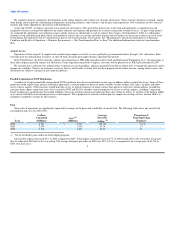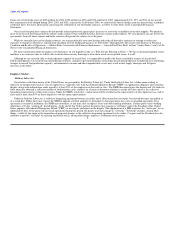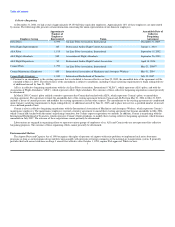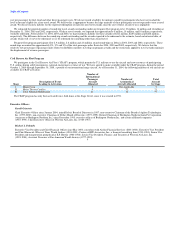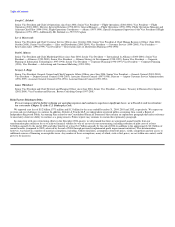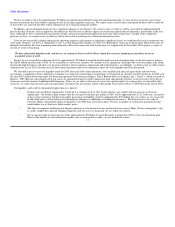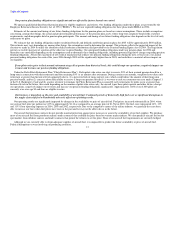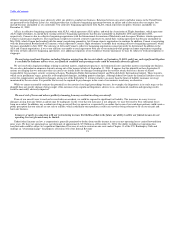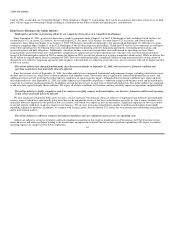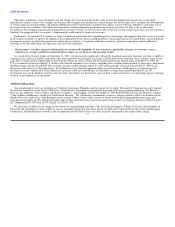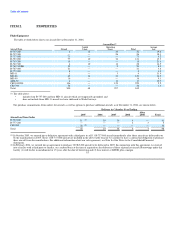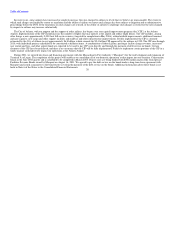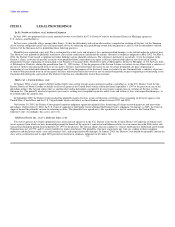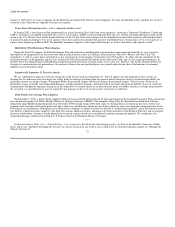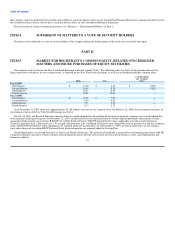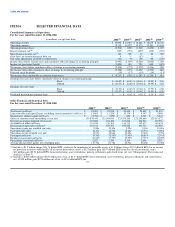Delta Airlines 2004 Annual Report Download - page 19
Download and view the complete annual report
Please find page 19 of the 2004 Delta Airlines annual report below. You can navigate through the pages in the report by either clicking on the pages listed below, or by using the keyword search tool below to find specific information within the annual report.
Table of Contents
affiliates' unionized employees may adversely affect our ability to conduct our business. Relations between air carriers and labor unions in the United States
are governed by the Railway Labor Act, which provides that a collective bargaining agreement between an airline and a labor union does not expire, but
instead becomes amendable as of a stated date. Our collective bargaining agreement with ALPA, which represents our pilots, becomes amendable on
December 31, 2009.
ASA is in collective bargaining negotiations with ALPA, which represents ASA's pilots, and with the Association of Flight Attendants, which represents
ASA's flight attendants, to amend their existing collective bargaining agreements that became amendable in September 2002 and September 2003,
respectively. Comair is also in collective bargaining negotiations with the International Association of Machinists and Aerospace Workers, which represents
Comair's maintenance employees. The maintenance employees rejected a tentative agreement to amend their existing agreement that became amendable in
May 2004, which Comair had reached with the union's negotiating committee, but Comair expects negotiations to continue. In addition, Comair is negotiating
with the International Brotherhood of Teamsters, which represents Comair's flight attendants, to modify their existing collective bargaining agreement, which
becomes amendable in July 2007. The outcome of ASA and Comair's collective bargaining negotiations cannot presently be determined. In addition to the
ASA and Comair negotiations, if we or our affiliates are unable to reach agreement with any of our unionized work groups on future negotiations regarding
the terms of their collective bargaining agreements, or if additional segments of our workforce become unionized, we may be subject to work interruptions or
stoppages.
We are facing significant litigation, including litigation arising from the terrorist attacks on September 11, 2001, and if any such significant litigation
is concluded in a manner adverse to us, our financial condition and operating results could be materially adversely affected.
We are involved in legal proceedings relating to antitrust matters, employment practices, environmental issues and other matters concerning our business.
We are also a defendant in numerous lawsuits arising out of the terrorist attacks of September 11, 2001. It appears that the plaintiffs in these September 11
actions are alleging that we and many other air carriers are jointly liable for damages resulting from the terrorist attacks based on a theory of shared
responsibility for passenger security screening at Logan, Washington Dulles International Airport and Newark Liberty International Airport. These lawsuits,
which are in preliminary stages, generally seek unspecified damages, including punitive damages. Although federal law limits the financial liability of any air
carrier for compensatory and punitive damages arising out of the September 11 terrorist attacks to no more than the limits of liability insurance coverage
maintained by the air carrier, it is possible that we may be required to pay damages in the event of our insurer's insolvency or otherwise.
While we cannot reasonably estimate the potential loss for certain of our legal proceedings because, for example, the litigation is in its early stages or the
plaintiff does not specify damages being sought, if the outcome of any significant litigation is adverse to us, our financial condition and operating results
could be materially adversely impacted.
We are at risk of losses and adverse publicity stemming from any accident involving our aircraft.
If one of our aircraft were to crash or be involved in an accident, we could be exposed to significant tort liability. The insurance we carry to cover
damages arising from any future accidents may be inadequate. In the event that our insurance is not adequate, we may be forced to bear substantial losses
from an accident. In addition, any accident involving an aircraft that we operate or is operated by an airline that is one of our codeshare partners could create a
public perception that our aircraft are not safe or reliable, which could harm our reputation, result in air travelers being reluctant to fly on our aircraft and
harm our business.
Issuances of equity in connection with our restructuring increase the likelihood that in the future our ability to utilize our federal income tax net
operating loss carryforwards may be limited.
Under federal income tax law, a corporation is generally permitted to deduct from taxable income in any year net operating losses carried forward from
prior years. We have net operating loss carryforwards of approximately $7.5 billion as of December 31, 2004. Our ability to deduct net operating loss
carryforwards could be subject to a significant limitation if we were to seek to restructure our costs under Chapter 11 of the U.S. Bankruptcy Code and
undergo an "ownership change" for purposes of Section 382 of the Internal Revenue
15


